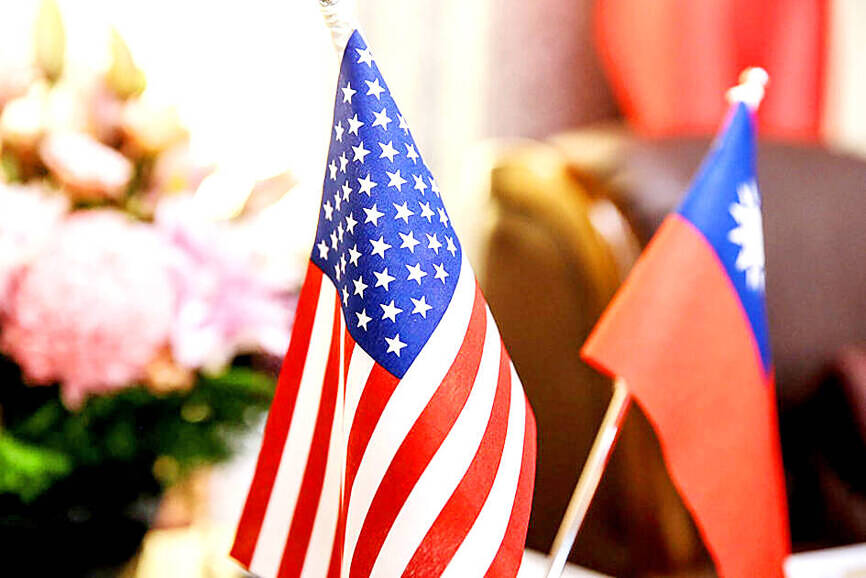Joint weapons production by Taiwan and the US should focus on projects that are of relatively low complexity and within the capabilities Taiwan has now, a nominee for a key US Department of Defense post said.
Alexander Velez-Green, the nominee for deputy undersecretary of defense for policy, gave the assessment in his response to policy questions on “security capabilities” suitable for coproduction asked by the US Senate Armed Services Committee ahead of his confirmation hearing on Thursday.
Formal coproduction agreements often involve complicated and lengthy negotiations with partners and industries, he said, indicating that Taiwan should focus on projects that can be delivered quickly to bolster deterrence and support a “denial defense.”

Photo: Cheng I-hwa, Bloomberg
“Appropriate coproduction or similar opportunities should focus on less technically complex capabilities for which Taiwan has existing workforce and production infrastructure,” he said.
On Thursday, Velez-Green told the committee that he has long supported arming Taiwan and ensuring it has the tools necessary to defend itself.
“I think that’s vitally important, not just as a matter of fairness, but also, frankly, from an operational perspective,” he said.
“If confirmed, you have my strong commitment to continue to advocate to that effect, including by providing options up to higher leadership for their consideration,” he said, adding that one option was a presidential drawdown authority (PDA).
Asked whether the fourth PDA for Taiwan under the administration of US President Donald Trump was on hold, Velez-Green said he was unsure of its status.
Asked about Taiwan’s role in deterring China and the need to expedite arms deliveries, Velez-Green said that “with respect to Taiwan and the first island chain, this is a critical terrain when we think about operating from a position of military strength in the Indo-Pacific” region.
“Having forceful deterrence along that geography is vital to ensuring a balance of power that allows us to achieve our ends,” he said.
The US’ focus is on the “denial of defense,” aimed at convincing China that any attempt at aggression would not only be costly, but would ultimately fail, making it not worth the risk, he said.
This also involves the role that US allies and partners can play in “this critical region,” he said, adding that it would be a problem if Washington could not provide allies or partners with the weapons they need.
In his written responses, Velez-Green said that “Taiwan needs to do more and faster, first and foremost by significantly increasing its defense spending and rapidly acquiring the appropriate weapons and systems needed to deter aggression from China.”
The US government has repeatedly pushed Taiwan to spend more on its own defense, with some officials calling for spending of up to 10 percent of GDP.
President William Lai (賴清德) has vowed to increase defense spending to more than 3 percent of GDP next year.
US lawmakers have said that arms vendors have been slow to deliver weapons ordered by Taiwan, potentially hurting its defense and deterrence posture.

The manufacture of the remaining 28 M1A2T Abrams tanks Taiwan purchased from the US has recently been completed, and they are expected to be delivered within the next one to two months, a source said yesterday. The Ministry of National Defense is arranging cargo ships to transport the tanks to Taiwan as soon as possible, said the source, who is familiar with the matter. The estimated arrival time ranges from late this month to early next month, the source said. The 28 Abrams tanks make up the third and final batch of a total of 108 tanks, valued at about NT$40.5 billion

Two Taiwanese prosecutors were questioned by Chinese security personnel at their hotel during a trip to China’s Henan Province this month, the Mainland Affairs Council (MAC) said yesterday. The officers had personal information on the prosecutors, including “when they were assigned to their posts, their work locations and job titles,” MAC Deputy Minister and spokesman Liang Wen-chieh (梁文傑) said. On top of asking about their agencies and positions, the officers also questioned the prosecutors about the Cross-Strait Joint Crime-Fighting and Judicial Mutual Assistance Agreement, a pact that serves as the framework for Taiwan-China cooperation on combating crime and providing judicial assistance, Liang

A group from the Taiwanese Designers in Australia association yesterday represented Taiwan at the Midsumma Pride March in Melbourne. The march, held in the St. Kilda suburb, is the city’s largest LGBTQIA+ parade and the flagship event of the annual Midsumma Festival. It attracted more than 45,000 spectators who supported the 400 groups and 10,000 marchers that participated this year, the association said. Taiwanese Designers said they organized a team to march for Taiwan this year, joining politicians, government agencies, professionals and community organizations in showing support for LGBTQIA+ people and diverse communities. As the first country in Asia to legalize same-sex

MOTIVES QUESTIONED The PLA considers Xi’s policies toward Taiwan to be driven by personal considerations rather than military assessment, the Epoch Times reports Chinese President Xi Jinping’s (習近平) latest purge of the Chinese People’s Liberation Army (PLA) leadership might have been prompted by the military’s opposition to plans of invading Taiwan, the Epoch Times said. The Chinese military opposes waging war against Taiwan by a large consensus, putting it at odds with Xi’s vision, the Falun Gong-affiliated daily said in a report on Thursday, citing anonymous sources with insight into the PLA’s inner workings. The opposition is not the opinion of a few generals, but a widely shared view among the PLA cadre, the Epoch Times cited them as saying. “Chinese forces know full well that